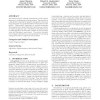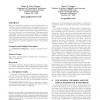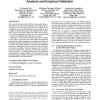11 search results - page 2 / 3 » General Schema Theory for Genetic Programming with Subtree-S... |
GECCO
2005
Springer
13 years 10 months ago
2005
Springer
The authors employ multiple crossovers as a novel natural extension to crossovers as a mixing operator. They use this as a framework to explore the ideas of code growth. Empirical...
GECCO
2009
Springer
13 years 12 months ago
2009
Springer
When an optimization problem is encoded using genetic algorithms, one must address issues of population size, crossover and mutation operators and probabilities, stopping criteria...
GECCO
2005
Springer
13 years 10 months ago
2005
Springer
Evaluating GP schema in context is considered to be a complex, and, at times impossible, task. The tightly linked nodes of a GP tree is the main reason behind its complexity. This...
GECCO
2008
Springer
13 years 6 months ago
2008
Springer
The crossover bias theory for bloat [18] is a recent result which predicts that bloat is caused by the sampling of short, unfit programs. This theory is clear and simple, but it ...
GECCO
2005
Springer
13 years 10 months ago
2005
Springer
We propose a new methodology to look at the fitness contributions (semantics) of different schemata in Genetic Programming (GP). We hypothesize that the significance of a schem...



